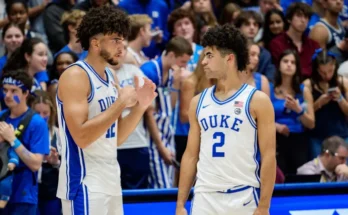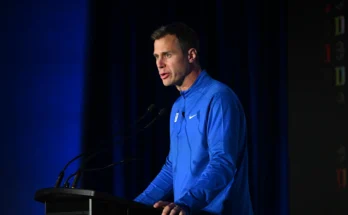OILERS EYE KEY GOALTENDING MOVE — $1.8 Million Veteran Targeted to Challenge Stuart Skinner and Bolster Edmonton’s Championship Aspirations
The Edmonton Oilers are reportedly targeting a veteran goaltender on a projected $1.8 million deal this offseason, a move designed not just to fill out the depth chart but to provide legitimate competition for Stuart Skinner, whose up-and-down postseason performance raised concerns throughout the organization. The idea isn’t merely to secure a backup—it’s to push Skinner, challenge his hold on the starting job, and force him to elevate his game as the Oilers continue their relentless pursuit of a Stanley Cup.
For Edmonton, this decision carries significant weight. The Oilers have leaned heavily on Skinner in recent years, making him their go-to netminder throughout multiple playoff runs. And while there have been moments of brilliance, there have also been too many nights where inconsistency derailed the team’s momentum. Edmonton’s core—featuring the unmatched brilliance of Connor McDavid and Leon Draisaitl—is in the middle of its prime, and wasting any year due to unstable goaltending is no longer acceptable. Bringing in a capable veteran on a short-term, manageable contract offers both insurance and incentive.
Reports suggest that the Oilers are circling a goaltender with NHL experience, a solid track record in high-pressure situations, and the mental toughness to step into the starter’s crease if Skinner falters again. While names have yet to be confirmed publicly, sources indicate that this is not a mere depth signing. It’s a strategic maneuver—one that could reshape the dynamic in the Oilers’ crease and signal a shift in the organization’s approach to roster construction.
Skinner, for all his potential and Edmonton-born narrative appeal, struggled mightily at key points during the 2024–25 postseason. His glove-side vulnerabilities were exposed, his rebound control went missing under duress, and his ability to hold leads in tight games became a question mark. While head coach Kris Knoblauch showed confidence in his young netminder by continuing to roll him out game after game, it became clear that Skinner lacked the consistent support and internal competition that many starting goalies thrive under.
This move, then, is not just about insurance—it’s about accountability. A $1.8 million contract isn’t typically what teams pay for a pure backup. It’s the going rate for a 1B option, someone who can play 30–40 games a year and carry the load if necessary. That type of player forces the starter to earn his ice time. He brings urgency to every morning skate, every pregame warm-up, every stretch of back-to-back games. And for a team with championship ambitions, that kind of tension can be a good thing.
There’s also the salary cap to consider. Edmonton doesn’t have the flexibility to go after top-tier netminders in the $5–6 million range, especially with Draisaitl and McDavid extensions looming. But $1.8 million fits snugly into the budget. It allows the team to make a low-risk, high-reward bet on a goaltender who could stabilize the crease, buy Skinner time to rediscover his form, and step in when the lights shine brightest. That cost-controlled flexibility is vital for a team trying to keep its core together while still improving around the edges.
One possible candidate believed to be on Edmonton’s radar is a veteran who has bounced around the league but maintains a strong reputation for professionalism, preparation, and poise. He’s the type of goalie who may not steal a playoff series on his own but can keep the team competitive every night—especially when playing behind a high-octane offense like Edmonton’s. His presence in the locker room could also provide much-needed mentorship to Skinner, who, despite being the starter, is still developing the mental side of his game.
Knoblauch and Oilers GM Jeff Jackson seem aligned in their thinking: the team’s championship window is now, and there’s no time left for guesswork. While Skinner may ultimately emerge as the long-term solution, they can no longer afford to give him a leash so long that it costs the team another playoff run. With McDavid and Draisaitl both potentially entering the final years of their current contracts, every decision must serve the goal of immediate success.
The Oilers’ defensive core has improved over the past two seasons, giving their goaltenders better looks and fewer second-chance opportunities. Evan Bouchard has emerged as a legitimate top-pairing defenseman, and the addition of strong, responsible forwards like Ryan McLeod and Connor Brown has helped shore up the team’s overall structure. Yet goaltending remains the great unknown—the one variable that can’t afford to collapse under pressure.
Bringing in this veteran presence also allows Knoblauch to better manage the grind of the regular season. Load management has become an essential strategy across the league, especially in the crease. By splitting time more evenly, Skinner can remain fresher for the postseason, a luxury the Oilers haven’t had in years. And if Skinner struggles, Knoblauch won’t hesitate to ride the hot hand—something past coaching staffs were reluctant to do, perhaps out of fear of undermining Skinner’s confidence.
The message this sends to Skinner is clear: the job isn’t yours by default anymore. That doesn’t mean he’s being discarded. On the contrary, this may be the best thing for his development. Many goaltenders take several seasons to find their consistency—some even benefit from setbacks that force them to reassess their mental approach, technique, and preparation. A little pressure, properly applied, can bring out the best in a competitor. The Oilers are banking on that effect.
Fans, for their part, are likely to embrace the move. After years of goaltending uncertainty—ranging from aging veterans past their prime to young hopefuls thrust into roles too soon—the fanbase is ready for a more calculated plan in the crease. The excitement surrounding McDavid and Draisaitl remains sky-high, but Oilers supporters know that a Stanley Cup cannot be won without at least average goaltending, if not elite performances when it matters. A veteran challenger at $1.8 million doesn’t guarantee anything, but it raises the team’s floor, which might be all that’s needed.
There’s also an intangible benefit to this signing: it signals a change in mindset. Too often, the Oilers have been reactive when it comes to goaltending. Now, they’re being proactive. They’re not waiting for Skinner to falter before making a move—they’re building in a safeguard, a challenge, a Plan B. That’s what smart organizations do when they know they’re close to contending.
And if Skinner rises to the challenge? Even better. If the competition brings out his best hockey, then the Oilers win twice—by getting better goaltending and by nurturing a young starter who learns how to thrive under pressure. If he falters, the team isn’t doomed. There’s someone capable waiting in the wings. That’s the kind of depth championship teams build their seasons on.
As training camp approaches, all eyes will be on the crease in Edmonton. The pressure is mounting, the expectations are high, and the window is narrowing. McDavid and Draisaitl won’t be around forever, at least not under their current contracts, and the Oilers can’t afford another year of what-ifs.
By reportedly targeting a proven veteran goaltender at $1.8 million, the Oilers are making a statement. They’re tired of uncertainty. They’re ready to push their players, demand more from their stars, and eliminate the variables that have haunted them in the past. Goaltending is the last box to check—and this move could be the one that finally gives them a complete, championship-ready roster.



